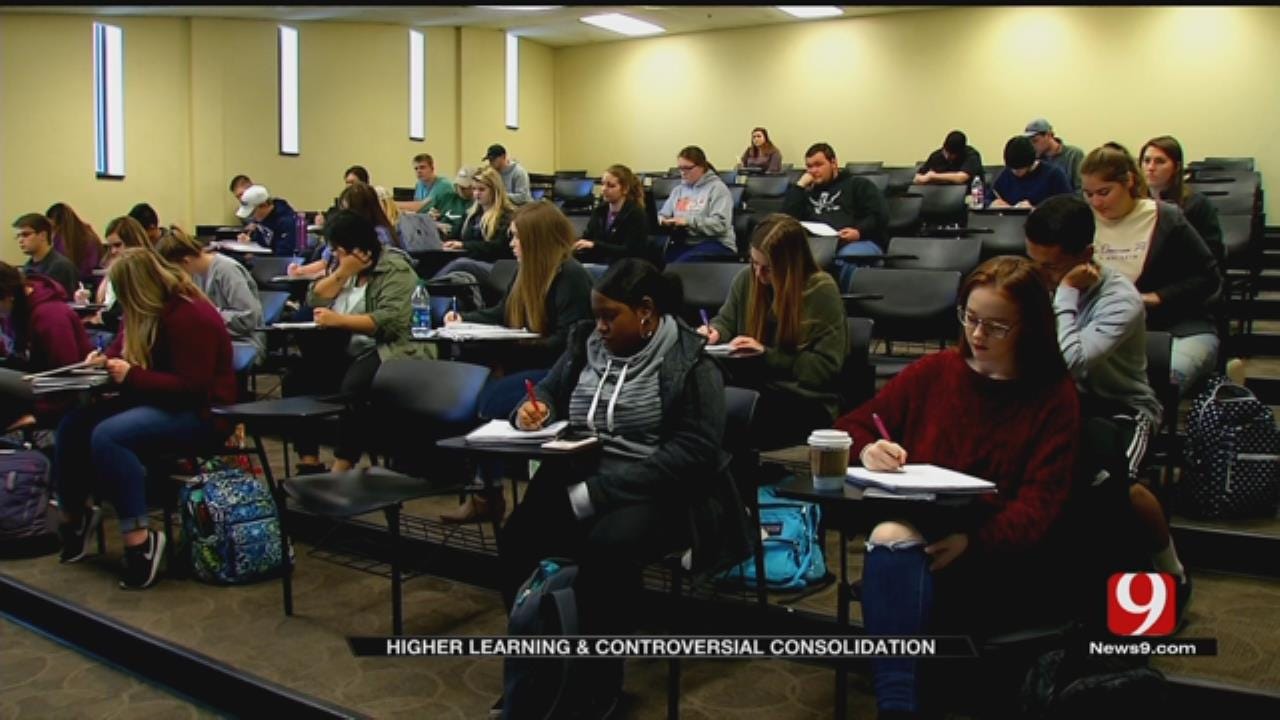9 Investigates: Higher Learning And Controversial Consolidation
<p>For students hoping to earn a college degree, choosing the right school is important, and can hinge on any number of factors.</p>Thursday, June 14th 2018, 5:32 pm
For students hoping to earn a college degree, choosing the right school is important, and can hinge on any number of factors: the school's location, its size, the degree programs offered, academic standards, quality and access to professors.
In Professor Mark Paulisson's biology class, students have a lot to take in.
"So the axon of the postganglionic neuron goes through the gray remus communicans, back to the spinal nerve," Paulisson repeated, during a recent lecture on the autonomic nervous system.
Biology is hard, no matter where it's being taught, but at least in Paulisson's class, the students have direct access to the professor.
"Most of our classes are small enough," Paulisson explained, "that we get to know the names of our students and get to know them fairly well."
That includes students like Rayleigh Beck: "I feel like it's a lot easier to focus here."
"Here" is Northeastern State University, in Tahlequah. Beck says she had been leaning toward attending Oklahoma State University, in Stillwater, but decided to visit NSU, since it's closer to home.
"It seemed like a family," Beck remembered, "more close knit. I really liked that, and now I'm here."
By the numbers, NSU is the fourth-largest of all the state universities, with about 8,100 full- and part-time students. It's is one of the six schools that make up the Regional University System of Oklahoma (RUSO).
Since 2015, each RUSO institution has lost about a quarter of its state funding, which is significant, considering these schools count on the state for about a third of their overall operating revenue.
NSU's President, Steve Turner, says it's been a challenge to maintain excellence in this climate, but says they've found a way.
"The six RUSO institutions create about forty percent of all the degrees in Oklahoma," Turner stated, "so we're really a critical part of the system."
But to some conservatives, it's a system that is simply too big -- bloated by self-serving lawmakers.
"There's no greater monument to the good ol' boy system that reigned in Oklahoma for decades," said Oklahoma Council of Public Affairs President Jonathan Small, "than the current higher education footprint."
Each year, it seems, one of the most controversial topics during the legislative session is the notion that Oklahoma would save tens of millions of dollars if it would just consolidate its K-12 school districts.
That debate hasn't gone away. But the OCPA's Small and other small government advocates believe it's not just common education that needs consolidation, but also higher education.
"When you compare us to other states that have a smaller population like us," Small said, "they don't have near the number of colleges and universities that Oklahoma has."
According to data (located at the bottom of the story) from the National Center for Education Statistics, Oklahoma has 80 public institutions of higher learning. That's seventh most in the nation; per capita, it's second in the nation.
Critics say that would be fine. if Oklahoma were also ranked that high in the number of degrees being earned, but we're not -- we're 42nd.
"The thing that concerns me," said former Governor Frank Keating, "is I think there are a number of those schools that exist for the purpose of employment in the community and employment of ex-political people."
It’s not clear how many former politicians are now employed in higher education, but former Governor Keating says the only employment these schools should focus on is the employment of graduating students. He says a BRAC process, similar to what's been used to consolidate the nation's military bases, could cut redundant overhead and facilities, and also cut degree programs that don't lead to jobs.
"We have to ask these questions," stated Keating, "are we basically -- I don't mean this to be disrespectful, but -- giving a degree in blotting, erasing and advanced pencil sharpening? I mean, some of these degree programs, they don't hire anybody out of those."
To Keating's question, there is a simple answer in the NSA President's office: "In my world," said Pres. Turner, "there are no bad degrees."
Turner points out a state task force just completed a year-long study of higher education, and says recommendations for efficiency and cost reduction are already being implemented. But he bristles at the notion of assigning value to degrees based on job potential.
"I think that that is a slippery slope that should be avoided." Turner exclaimed, "because I think our job is to help prepare Oklahomans for life, not just a degree."
The debate may not just be academic. The longer conservatives control the Capitol, the more likely that conservative philosophy will eventually extend to the campus.
Students like Rayleigh Beck say Oklahoma needs schools like NSU, and hopes state leaders are smart enough to see that.
"I think they should keep doing what they're doing," said Beck.
More Like This
June 14th, 2018
December 5th, 2019
October 17th, 2019
August 29th, 2019
Top Headlines
April 3rd, 2025
April 3rd, 2025
April 3rd, 2025
April 3rd, 2025













